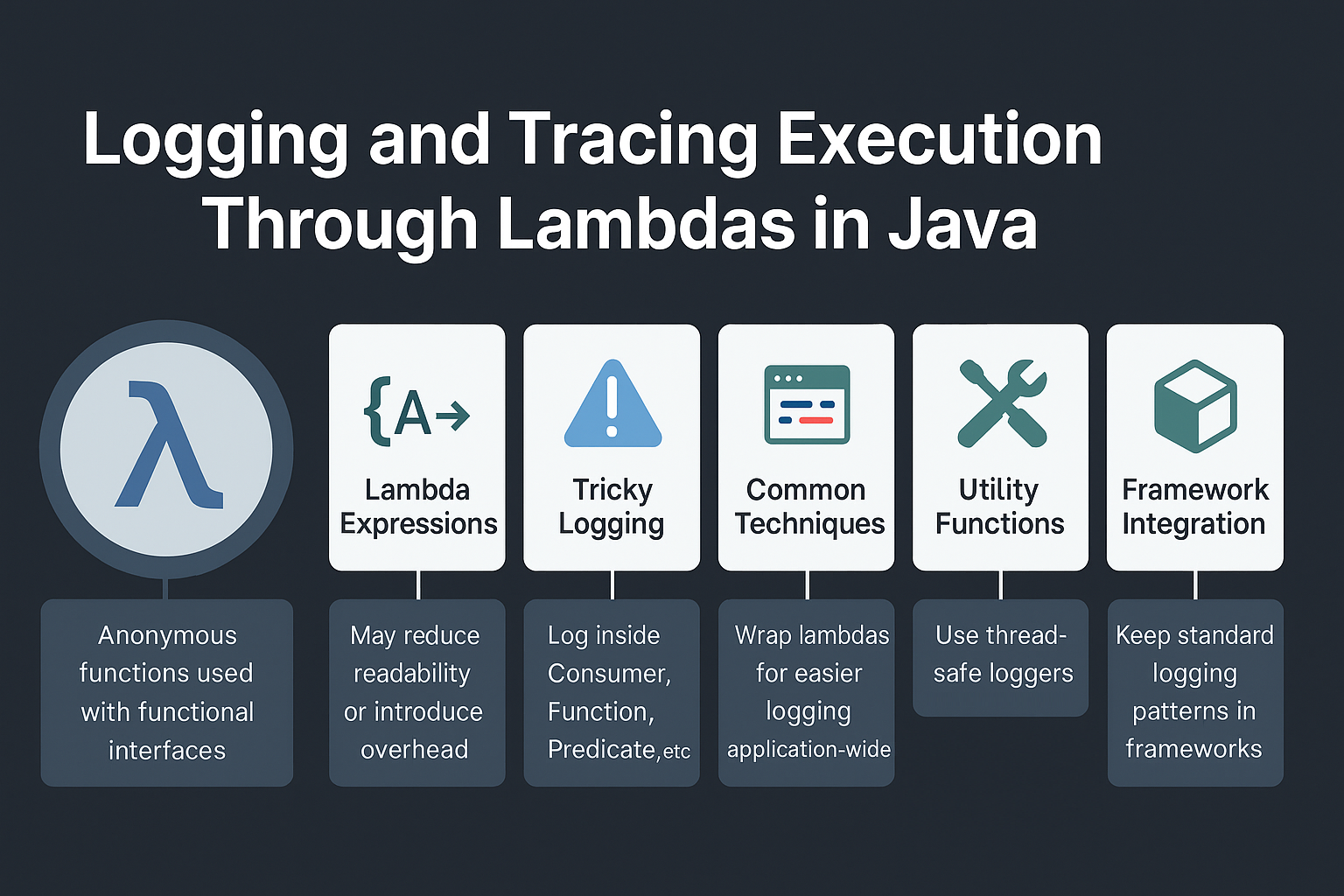Lambdas brought a wave of expressive, concise, and functional style to Java with the introduction of Java 8. But while writing clean, elegant code is a major win, it sometimes comes at the cost of visibility and debuggability.
In traditional imperative code, logging and tracing were straightforward—you’d add a print or log statement where needed. With lambdas, however, especially in stream pipelines or chained functional interfaces, debugging and tracing become trickier.
This article walks through the techniques, challenges, and best practices for logging and tracing execution within lambdas, from Java 8 through Java 21. You'll learn how to maintain transparency and control in functional-style code without compromising readability or performance.
What Are Lambda Expressions in Java?
Lambda expressions are anonymous functions—blocks of code you can pass around just like objects. They allow behavior to be treated as data.
// Traditional anonymous class
Runnable task = new Runnable() {
@Override
public void run() {
System.out.println("Running");
}
};
// Lambda expression
Runnable lambdaTask = () -> System.out.println("Running");
Lambdas work seamlessly with functional interfaces—interfaces with a single abstract method (SAM). Examples include Runnable, Callable, Predicate, Function, Consumer, and Supplier.
Why Logging in Lambdas Is Tricky
Lambdas are often used inside streams, event handlers, and asynchronous code. Logging in these places may:
- Be swallowed or lost if not handled carefully
- Reduce readability if mixed directly into chained lambdas
- Introduce performance overhead if used excessively
📍 Common Functional Interfaces and Logging Techniques
Logging Inside Consumer
List<String> names = List.of("Alice", "Bob", "Charlie");
names.forEach(name -> {
System.out.println("Processing: " + name);
// your logic here
});
Logging with Function and Predicate
Predicate<String> startsWithA = s -> {
boolean result = s.startsWith("A");
System.out.println("Checked " + s + ", result: " + result);
return result;
};
List.of("Apple", "Banana", "Avocado").stream()
.filter(startsWithA)
.forEach(System.out::println);
🧰 Utility Function to Wrap Logging
To avoid code duplication, you can create wrappers:
static <T> Predicate<T> logPredicate(String label, Predicate<T> predicate) {
return t -> {
boolean result = predicate.test(t);
System.out.println(label + ": " + t + " -> " + result);
return result;
};
}
🔄 Composing and Chaining with Logging
Function<String, String> trim = String::trim;
Function<String, String> upper = String::toUpperCase;
Function<String, String> logAndTransform = trim
.andThen(s -> {
System.out.println("Trimmed: " + s);
return s;
})
.andThen(upper)
.andThen(s -> {
System.out.println("Uppercase: " + s);
return s;
});
logAndTransform.apply(" hello ");
🧵 Thread Safety Considerations
Be careful when lambdas run in multi-threaded environments (like parallelStream() or ExecutorService). Logging from multiple threads can result in interleaved outputs.
Use thread-safe loggers like SLF4J with logback:
private static final Logger log = LoggerFactory.getLogger(MyClass.class);
🛠 Integration with Frameworks (e.g., Spring)
@RestController
public class MyController {
private static final Logger log = LoggerFactory.getLogger(MyController.class);
@GetMapping("/users")
public List<User> getUsers() {
return userService.getAllUsers()
.stream()
.peek(user -> log.info("Fetched: {}", user))
.collect(Collectors.toList());
}
}
⚠️ Pitfalls and Anti-Patterns
- Logging too much inside lambdas can pollute your stream pipeline
- Avoid
System.out.printlnin production; use proper logging framework - Never mutate external state inside lambdas used in streams
🔁 Refactoring with Logging in Mind
Function<String, String> toJson = s -> {
String json = "{ "data": "" + s + "" }";
System.out.println("Serialized: " + json);
return json;
};
Move logging logic to a decorator-style wrapper when possible.
📌 What's New in Java Versions?
Java 8
- Introduced lambdas, functional interfaces, streams,
java.util.function
Java 9–11
Optional.ifPresentOrElse- Local variable type inference (
var) allowed in lambdas (Java 11)
Java 17
- Enhanced sealed interfaces + better performance under the hood
Java 21
- Scoped values for structured concurrency (ideal for tracing)
- Virtual threads support functional style concurrency
✅ Conclusion and Key Takeaways
- Use lambdas for clarity but ensure they are traceable during execution
- Prefer utility wrappers for standardized logging
- Consider thread safety and avoid mutating shared state
- Use proper loggers like SLF4J or Log4j2, not
System.out
❓ FAQ
1. Can I use lambdas for exception handling?
Yes, but wrap them carefully. Lambdas can't throw checked exceptions unless the interface allows.
2. What’s the difference between Consumer and Function?Consumer<T> performs an action and returns nothing. Function<T, R> transforms and returns a result.
3. Are lambdas garbage collected like normal objects?
Yes. Lambdas are objects and subject to GC like any other reference.
4. When should I use method references over lambdas?
Use method references when the lambda just calls an existing method.
5. How can I trace a stream pipeline?
Use peek() for side effects like logging, but avoid changing data.
6. Can lambdas capture variables?
Yes, but only effectively final ones (not reassigned after capture).
7. Are lambdas thread-safe?
Not inherently. Thread safety depends on shared state and execution context.
8. Is logging inside lambdas a bad practice?
Not always—but avoid cluttering logic. Use it for traceability, not debugging.
9. Can I create my own functional interface?
Yes, annotate with @FunctionalInterface. Ensure it has one abstract method.
10. Should I use lambdas in performance-critical paths?
Use them judiciously. They are optimized by the JVM, but overuse can add GC pressure.
